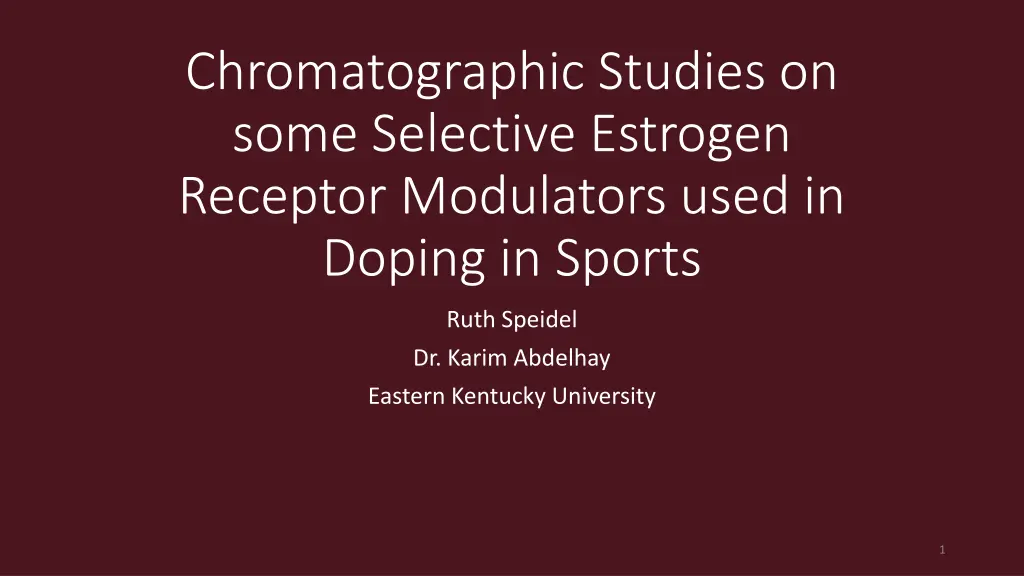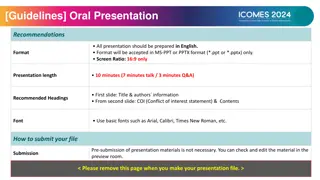
Chromatographic Studies on Selective Estrogen Receptor Modulators
Explore the chromatographic studies on selective estrogen receptor modulators like toremifene and trimetazidine, including their medical and doping uses. Learn about the analytical methods and absorption profiles of these substances, shedding light on their potential significance in sports doping.
Download Presentation

Please find below an Image/Link to download the presentation.
The content on the website is provided AS IS for your information and personal use only. It may not be sold, licensed, or shared on other websites without obtaining consent from the author. If you encounter any issues during the download, it is possible that the publisher has removed the file from their server.
You are allowed to download the files provided on this website for personal or commercial use, subject to the condition that they are used lawfully. All files are the property of their respective owners.
The content on the website is provided AS IS for your information and personal use only. It may not be sold, licensed, or shared on other websites without obtaining consent from the author.
E N D
Presentation Transcript
Chromatographic Studies on some Selective Estrogen Receptor Modulators used in Doping in Sports Ruth Speidel Dr. Karim Abdelhay Eastern Kentucky University 1
Toremifene Selective Estrogen Receptor Modulator Hormone Modulator Medical Use: Breast Cancer and Osteoporosis Doping Use: Increase Testosterone Levels (in men) Blocks estrogen activity Prevents gynecomastia (unlike anabolic steroids) 4
Toremifene Absorption: Peak plasma concentration 2-6 hours Distribution: 99.7% binds to plasma protein Elimination: Majority in feces 1.Taras, T.L.; Wurz, G.T.; Linares, G.R.; DeGregorio, M.W. Clinical Pharmacokinetics of Toremifene. Clin Pharmacokinet2000, 39(5): 327-334. 5
Trimetazidine Metabolic Modulator Medical Use: treat angina pectoris (not FDA approved) Doping Use: decrease contractility increase fatty acid oxidation (ATP production) 6
Trimetazidine Absorption: Peak plasma concentration 2 hours Distribution: Weakly binds to plasma proteins Elimination: Approximately 80% eliminated in the urine Approximately 60% unchanged parent compound Dazsi, C.A. Trimetazidine in Practice :Review of the Clinical and Experimental Evidence. Am J Therap2016, 23: 871-879 7
GC-MS Gas Chromatography- Mass Spectroscopy Gas Chromatography Column: HP-5ms (5%-phenyl)- methlpolysiloxane Mobile Phase: Helium Mass Spec Ionization Source (Electron Ionization) Mass Analyzer (Quadrupole) Detector (Electron Multiplier) 8
Method Development and Method Optimization 9
Method Development Toremifene Retention Time: 24.9 min Inlet 250oC 10 psi Auxiliary Heater 280oC Temperature Program 10
Method Optimization Toremifene Retention Time: 20.8 min Inlet & Aux heater Same Temperature Program Retention Time: 16.8 min Inlet & Aux heater Same Temperature Program 11
Method Optimization Toremifene Retention Time: 15.9 min Inlet & Aux heater Same Temperature Program 12
Method Development Trimetazidine Retention Time: 17.3 min Inlet 250oC 10 psi Auxiliary Heater 280oC Temperature Program 14
Method Optimization Trimetazidine Retention Time: 10.2 min Inlet & Aux heater Same Temperature Program Retention Time: 14.0 min Inlet & Aux heater Same Temperature Program 15
Calibration 17
Internal Standard Toremifene Toremifene Tamoxifen 19
Internal Standard Trimetazidine Trimetazidine Propranolol 22
Trimetazidine in Urine Liquid Extraction Add NaOH to urine until pH 12 Extract with 7 mL of Chloroform 25
Next Steps Use biological fluids Toremifene in Plasma Method Validation Demonstrate that it is suitable for its intended purpose 27
Acknowledgements Huge THANK YOU to Dr. Abdelhay Thank you to my committee members Dr. Jamie Fredricks Dr. Jerome May Dr. Cindy Tran 28






















